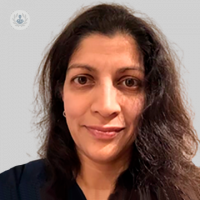What complications can diabetes lead to if not managed appropriately?
Escrito por:In this article below, Dr Natasha Patel, a highly experienced and esteemed consultant diabetologist, tells us why diet management is so essential for patients living with diabetes and why and technology can help people with the condition.

How does a specialist decide which treatment plan is best for diabetes?
It all depends on the underlying cause of somebody’s diabetes. There are many factors that are at play, and the treatment should be tailored to the individual. We have to consider the lifestyle of the individual too.
Why is diet management especially important?
The only way to put diabetes into remission is through lifestyle changes. There is no medication that will put diabetes into remission. The only way to delay the progression is lifestyle.
Although lifestyle may not have been the underlying cause of your diabetes, lifestyle and diet modifications are key when it comes to the management of diabetes.
Should people stick to a restricted carbohydrate diet? What foods cause high blood sugar?
Foods that cause high blood sugar are foods that naturally have a lot of sugar in them. Processed foods and foods with a lot of sugar cause a large increase in one’s blood sugar levels.
The fact of the matter is we all need carbohydrates for energy. I personally believe that it’s not necessary for people with diabetes to cut back on carbs, as there are other more effective ways to manage your glucose control other than just focussing on a low-carbohydrate diet.
How can technology help to manage diabetes?
Technology for Type 1 diabetes is an absolute game-changer. Now we have flash-glucose and continued-glucose monitors. They are patches that you can put on your arm. A flash-glucose monitor involves you having to check yourself, whereas a continued-glucose monitor can be connected to your phone.
Finger-prick tests are now no longer required, and that is why technology has been such a game-changer when it comes to managing diabetes. Insulin pumps are now also available, which takes away the need of having to inject insulin four to six times a day.
How does a specialist measure if the treatment plan is working?
There are several aspects to this. One is looking at the individual: is it easy for them to implement? The second component is looking at our biochemical results.
What complications can diabetes lead to if not managed appropriately?
Diabetes affects your vascular system: it affects the big and small blood vessels. Mismanaged diabetes can lead to heart attacks and strokes, whilst it can also affect vision and blood flow to the feet.
If you’d like to make an appointment with Dr Natasha Patel today, you can do just that by visiting her Top Doctors profile today.


